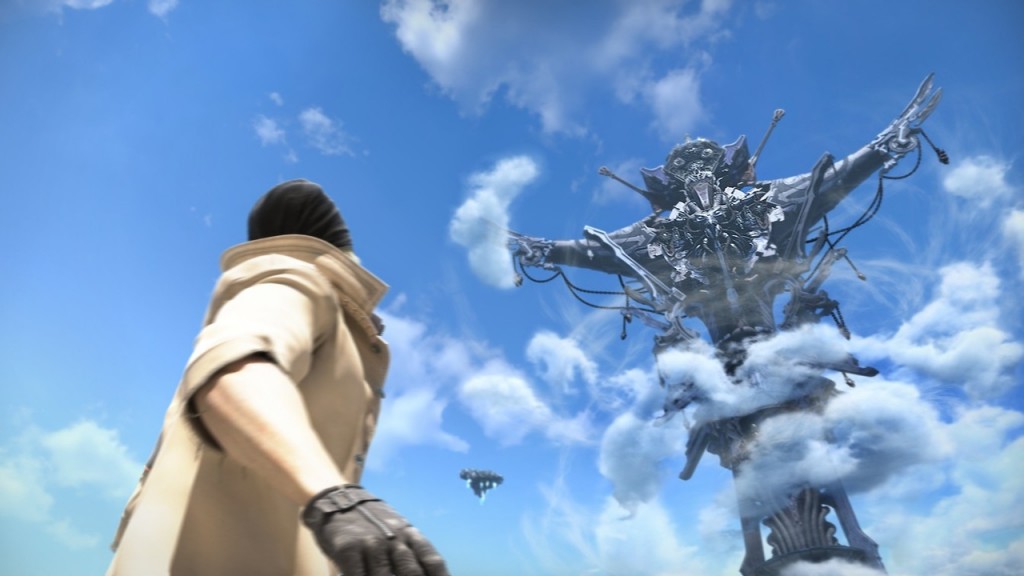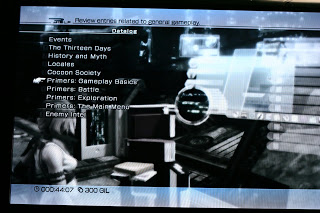Last updated on May 3, 2016
Part 1

Lighting, seeing her sister (and Snow’s fiancee) turning into crystal, attacks the Pulse fal’Cie Anima. In response, he turns them all into l’Cie, which starts us off on the grand adventure to figure out just what their shared vision was (it was Ragnarok, or something!). Of course, there’s a whole lot of deus ex machina in getting the six protagonists into the same picture, but that’s natural when we enter a new world like this: things must be explained, and even if not explained they must make sense in this world’s metaphysical structure. Which, as I’ve demonstrated, they do.
Interestingly, and this is an excellent narrative trope, they don’t understand what their task actually IS. Are they supposed to destroy Cocoon, seeing as their mark came from a Pulse fal’Cie? This causes disagreements in the party, which forces them to split up. Fundamentally, then, the whole plot consists of these people trying to find out what exactly they’re supposed to do. Sometimes, they draw away from their fate, as in the case of Lightning and Hope. Both of them wish to forget the past, but find themselves moving further and further from their goal by focusing (har) on a different, unrelated objective. Other characters find their loved ones turned into l’Cie, or even find that they are continually discovering what the will of these gods actually ARE. It’s a mystery to the characters, and a mystery to the audience – a perfect setting.
I imagine, from my perspective, that this is why we have the Datalog – it’s the Wikipedia of Final Fantasy XIII, revealing the various parts of the world and its metaphysical structure. Do you need this information? Absolutely not! In fact, I’d say the story as a whole works much better when you’re just blindly, and unknowingly, exploring a new world (if excessively linear like a tunnel) – you’re meant to relate to the protagonists in this way.

It’s especially effective when you find that the seemingly benevolent “gods” of Cocoon aren’t helping in all – in fact, the fal’Cie, especially the leader of the Cocoon fal’Cie, Barthandelus, actually wants to destroy Cocoon AND Pulse, as well as all of its human life, so that they can bring back the Maker. Orphan, which was the vision seen at the beginning of the game, actually powers all the Cocoon fal’Cie – by killing it (not going to bother guessing genders), they can open the Door of Souls and reunite with the Makers. Though not well explained in the context of the game, the Maker (or Makers – it’s definitely possible that there are two) are those that created Gran Pulse and Cocoon – after doing so, they left through the Door of Souls, never to return unless needed again. They set the fal’Cie in motion to keep the planets stable and prosperous, and left it to its own devices. If Final Fantasy XIII doesn’t promote deism, it sure feels like it. It also sounds a LOT like Sephiroth killing the planet to make himself a god. Yes, FFXIII cribs liberally from FFVII, but I imagine you would too if you had such a successful property.
I just explained this, but I did not know much of that was happening while PLAYING the game. That’s the essential point – you’re not supposed to get the story at first glance. Perhaps it’s the incompetence of the developers or their desire to confuse the player, but the structure of the world hasn’t been explained in any full way during the game. Rather, the characters need to understand themselves and their fate. Their entire lives, from the beginning to the end, is under the control of a bunch of gods who don’t see the value in human life. We see it, of course; the characters all develop and change in subtle ways through the narrative. At first, they lament and argue about their fate, but eventually accept their faults and failures, even overcoming the hopeless situations in which they find themselves (it’s Japanese melodrama, of course, but the good kind). In turn, they find the strength to resist their fate AND resist the will of the Cocoon fal’Cie, inevitably causing the destruction of Cocoon, but not the human race. Their objectives don’t change – Lightning wants her sister back, Sazh wants his son – but their reasoning changes. You could see it as a game about epiphanies and the meaninglessness of it all – that is, an examination of despair – but that removes the impact of the truly hopeful elements.
I’m not crying for the re-evaluation of the DEPTH and MEANING of said plot – it’s poorly told, all in all – but I found a charm in the game that most people did not. There’s a subtle undercurrent of battling fate, even as you unintentionally fulfill it. If there was a better example of this, it’s Jonah, although one gets a completely different message from there. In it, God forces Jonah to minister in Nineveh, precisely to save them from their own sinfulness. Jonah, however, doesn’t want to do that – he finds every method in his power to avoid this fate, yet God brings him back to it – he places him in a giant fish and brings him their against his own will. Unlike the gods of Cocoon, God wants to save rather than destroy – the destruction only occurs if the people fail to repent. Nineveh redeems itself almost immediately – the long suffering God of Israel does not enact His rightful judgement in the face of true repentance.
God does what He proclaims, and nothing different. He sets the rules, He makes the story, and He includes us in the action. Frankly, that’s pretty darn cool. So why do we continually reject our role, instead lamenting “Why, God, did you make me do this”, or seeing everything as a personal slight, or seeing one’s own current task as useless or insignificant? We often reject an all powerful God out of hubris, and to our detriment. We can act like Jonah, or maybe we can just suck it up and figure out what we’re supposed to do instead. That, at least, is what I got out of Final Fantasy XIII’s plot – full of ideas, even if it lacks the execution to make it work quite right.
I declared the former things long ago
And they went forth from My mouth, and I proclaimed them.
Suddenly I acted, and they came to pass.– Isaiah 48:3
Note: I don’t mention the sequels, precisely because I honestly can’t figure out how the latter two match up with this one. For now, I just analyzed it apart from that context. Maybe for a later time!
